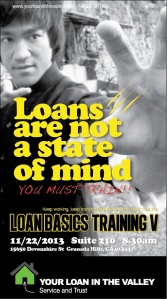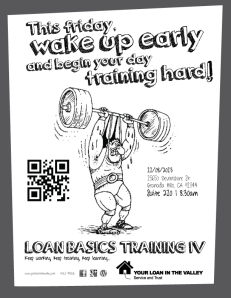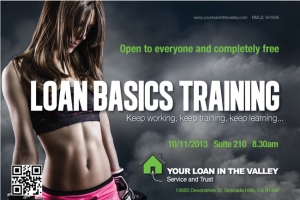Blog Archives
Best Mortgage tips for 2015
 After mortgage rates stayed surprisingly low in 2014, who knows how they will shake out in the New Year?
After mortgage rates stayed surprisingly low in 2014, who knows how they will shake out in the New Year?
Either way, borrowers who want to refinance or buy a home have the best chance to get the lowest rate by knowing more, not less, about the mortgage game.
These 10 tips can help you navigate the mortgage process in 2015.
Pay less mortgage insurance
Many homebuyers don’t have enough cash on hand to make a 20 percent down payment, which means that they generally are required to pay for mortgage insurance as part of their monthly mortgage payment. This insurance protects lenders when a borrower defaults on the loan.
Until late 2014, Fannie Mae and Freddie Mac required down payments of at least 10 percent. The requirement pushed many homebuyers into Federal Housing Administration-insured loans, which have a minimum down payment of 3.5 percent. The problem is that FHA premiums are costlier than private mortgage insurance.
But in 2015, qualified borrowers will be able to get Fannie- and Freddie-backed mortgages with down payments as little as 3 percent. Mortgage insurance premiums vary according to credit score and size of down payment, but private mortgage insurance premiums generally are more affordable than FHA premiums.
Get a thorough pre-approval
Not only do sellers often prefer buyers who come preapproved by a lender, making their offers more attractive, but a preapproved mortgage also can help you avoid any hiccups down the line.
With a real preapproval, a mortgage broker or bank loan officer will pull your credit report and submit supporting documentation to their automated underwriting system. This allows the bank to give you more accurate terms based on your actual credit score, debt obligations and income, instead of relying on your estimates. It also puts you ahead of the process when you finally go into contract and could help you close faster.
Maintain your credit profile
In the months leading to your home purchase, avoid changing your credit obligations, especially between a preapproval and the closing of your mortgage. The reason? It could hurt your credit score in a way that would raise the rate and fees related to your loan or, at worst, keep you from qualifying altogether.
Don’t close or open any credit cards. Keep balances on your credit cards within normal range so it won’t mess with your debt-to-income ratio, a key factor in determining mortgage rates. And don’t buy a new ride. The car company doesn’t care if you have a house, but your mortgage lender cares if you have a big car payment.
Get organized
Gather and keep every piece of financial paper in the two months leading up to buying a house. That means pay stubs, bank statements for savings, checking and investment accounts, W-2s, tax returns for the previous two years, canceled rent checks and any mortgage or property tax statements for other property you own. And for gosh sake, it’s almost 2015. Put these in PDF format to make it easier to send to your mortgage broker or bank.
Don’t move money around
In the months leading up to your home purchase, keep your hands off your finances. That includes moving money from a savings account into a certificate of deposit, or CD. It also means no cashing in investments from stocks, retirement accounts or CDs. Otherwise, you will create a huge headache for yourself as you try to show the bank the paper trail of where that money came from. In a similar vein, avoid paying off debts with savings because that could cause your lender to worry about how you will pay for closing costs.
Prepare to write letters
Lenders these days scrutinize every corner of your financial life, and if something looks funny, even just a little bit, they will want to know why. That means you will have to write letters explaining the oddity.
For example, they may want a letter explaining why a credit card issuer pulled your credit three months ago when you applied for a store credit card. Or, why Grandpa gave you a check for $500 around Christmas. Lenders also may want you to explain why you changed jobs a few months ago or why you moved around several times in the past year. Don’t fight it. Write ’em, send ’em and move on. Source: Bankrate.com
Your Loan in the Valley
Lead Generation Ground Rules
Want to have a successful and profitable business? Then you need leads… and lots of them.
Nothing happens without a lead. No sales, no revenue, no profit, no nothing.
GROUND RULE #1: BUILD A VALUE MACHINE FOR THE LONG TERM
We’ll start off with the lead generation technique that most people will not have the discipline or patience to pursue. That is creating a REAL value machine for your market. This could be a blog you post to daily, or a video series you create daily… or something else.
GROUND RULE #2: UNDERSTAND THAT THE MONEY IS NOT IN THE LIST
It appears that one of my lists currently has little to no “money” hiding in it. That’s because I filled it with freebie seekers instead of potential buyers. I built a list before I had something to sell. If I had it to do over, I wouldn’t bother. Learn from my mistake. You build lists NOT to get leads, but to get buyers.
GROUND RULE #3: YOU DON’T HAVE TIME TO WAIT AROUND FOR A RELATIONSHIP
People buy because they want things. They buy because they’re yearning for the perceived benefits of what you provide. Yes a relationship helps. But you can’t pay your bills or pay your expenses with relationships. So ask them to buy FAST.
Isn’t that why you’re in business? Don’t make excuses for it. Just sell. Source: diythemes.com by
Your Loan in the Valley
5 TIPS FOR SENDING BUSINESS HOLIDAY GREETING CARDS.
We’re getting close to the holiday season, and not only does that mean it’s time to start gift shopping for all of your friends and family on your list, but it’s also time to start thinking about sending holiday cards to your clients and colleagues.
Order Early
You are already ahead of the game by thinking about your holiday cards now. In fact, right now is the perfect time to order your cards, especially if you plan to include customization, branding or special designs. Use the next week or two to select and design your cards, and get your order in by the end of the month to ensure you have them in-hand on time.
Be Unique
You can, of course, just select a standard design from the card catalog, but why not try a different approach? You can create a very unique and memorable card that doesn’t have to break your budget. Some ideas include using the typically family-oriented photo card format to show a picture of your team, designing a flat greeting card that incorporates your actual business card, or selecting a humorous card to go for the laugh.
Brand Your Cards
Aside from using your actual business card incorporated into your greeting card, you can consider including some other forms of branding on your card. You will probably want to include your business name and URL, but also consider using your logo and even company colors to tie it all together.
Make It Personal
Many business holiday cards are pre-printed, giving them a professional look and feel. But make sure you take time to address your cards individually and write a personal message in each card. A handwritten note from you can be the difference between a throw-away business greeting card and one that is kept and remembered.
Skip Christmas
Who says a holiday card has to be sent for the big holidays? Consider sending a Thanksgiving card or a New Year’s card to separate yours from the masses that hit the mailbox every December.
Source: sitepoint.com
Your Loan in the Valley.
TALK TO A LOAN SPECIALIST ABOUT YOUR OPTIONS
Your Loan in the Valley
15650 Devonshire St. Ste 312, Granada Hills, CA 91344
818 810 4646
Top 7 Mistakes the Rookie Real Estate Agent Makes
1. No Business Plan or Business Strategy
So many new agents put all their emphasis on which Real Estate Brokerage they will join when their shiny new license comes in the mail. Why? Because most new Real Estate Agents have never been in business for themselves – they’ve only worked as employees. They, mistakenly, believe that getting into the Real Estate business is “getting a new job.” What they’re missing is that they’re about to go into business for themselves. If you’ve ever opened the doors to ANY business, you know that one of the key ingredients is your business plan. Your business plan helps you define where you’re going, how you’re getting there, and what it’s going to take for you to make your real estate business a success.
2. Not Using the Best Possible Closing Team
They say the greatest businesspeople surround themselves with people that are smarter than themselves. It takes a pretty big team to close a transaction – Buyer’s Agent, Listing Agent, Lender, Insurance Agent, Title Officer, Inspector, Appraiser, and sometimes more! As a Real Estate Agent, you are in the position to refer your client to whoever you choose, and you should make sure that anyone you refer in will be an asset to the transaction, not someone who will bring you more headache. And the closing team you refer in, or “put your name to,” are there to make you shine! When they perform well, you get to take part of the credit because you referred them into the transaction.
The deadliest duo out there is the New Real Estate Agent & New Mortgage Broker. They get together and decide that, through their combined marketing efforts, they can take over the world! They’re both focusing on the right part of their business – marketing – but they’re doing each other no favors by choosing to give each other business. If you refer in a bad insurance agent, it might cause a minor hiccup in the transaction – you make a simple phone call and a new agent can bind the property in less than an hour. However, because it typically takes at least two weeks to close a loan, if you use an inexperienced lender, the result can be disastrous! You may find yourself in a position of “begging for a contract extension,” or worse, being denied a contract extension.
A good closing team will typically know more than their role in the transaction. Due to this, you can turn to them with questions, and they will step in (quietly) when they see a potential mistake – because they want to help you, and in return receive more of your business. Using good, experienced players for your closing team will help you infinitely in conducting business worthy of MORE business…and best of all, it’s free!
3. Not Arming Themselves with the Necessary Tools
Getting started as a Real Estate Agent is expensive. The license alone is an investment that will cost between $700 and $900 (not taking into account the amount of time you’ll invest.) However, you’ll run into even more expenses when you go to arm yourself with the necessary tools of the trade. And don’t fool yourself – they are necessary – because your competitors are definitely using every tool to help THEM.
4. Lack of Proper Funding
If you’ve taken the time to create your business plan, than you should definitely have your budget, but I can’t stress enough the importance of having and following your budget. However, the budget alone doesn’t address the important aspect of funding. 90% of all small businesses fail due to lack of funding. Typically, new agents will want to have 3 months of reserves in savings before taking the leap into full time agency. However, money in the bank isn’t the only way to answer the question of funding. Maybe your partner can support you for a certain period of time. You can keep a part-time job that won’t interfere with your business as a Real Estate Agent. Many successful waiters make the transition to successful real estate agents with no money in the bank. When you start your new business, don’t expect to earn any income for, at the least, 60 days.
5. Refusing to Spend Money on Marketing
Most new Real Estate Agents don’t realize that the hardest part of the business is finding the business. Furthermore, they’ve just shelled out around $2000 for their license and board dues, so the LAST thing they want to do is to spend more money! Again, the problem lies in the lack of understanding that you’ve just jumped into the Real Estate Business, you haven’t taken a new job. And any good businessperson will tell you that how much business you GET is directly correlative to how much you SPEND on marketing. If you choose the right brokerage, then you will get some good inbound leads. However, don’t neglect a good, personal marketing campaign from the beginning to get your own name out as the Real Estate Agent to go to.
6. Not Focusing Their Marketing Efforts in the Most Effective Areas
One reason why many new Real Estate Agents who do begin spending money on personal marketing stop is because they spend it in the wrong place. The easiest place, and where conventional Real Estate tells you to spend your money, is in conventional print marketing – the newspaper, real estate magazines, etc… This is the most visible place to see real estate advertising, it’s where large offices spend a good part of their money, and so many new agents mistakenly spend their money here. This becomes very frustrating to new agents because of its low return. Large brokerages can afford to spend their money here because they’re filling two needs – they’re marketing their own properties for sale while creating new buyer traffic for their buyer’s agents. New Real Estate Agents should look to their own sphere of influence and referral marketing to see the most effective return on their investment. An agent can spend as little as $100/month marketing to their family, friends, and colleagues and see an incredible return. There are many great referral systems around that all focus on the same premise – that if you consistently market yourself to your sphere of influence as the Real Estate Agent to go to – then you will get more business. The key is to pick a system and to follow that system. You will see results.
7. Choosing the Wrong Brokerage for the Wrong Reasons
New Real Estate Agents choose their new broker for a variety of reasons – they have a good reputation, they offer the most competitive split, the office is close to their house, etc… While these alone aren’t bad reasons to choose a broker, they aren’t going to do a lot to help you in your success. The #1 reason to choose a broker, and the question to ask is, “What do you offer your new agents.” If the answer is, “The most competitive split in town” you should definitely keep looking. Remember, 100% of $0 is still $0. If you’re leaning towards the largest broker in town, who has a great reputation, remember this: You’re starting a BUSINESS not a JOB. While it might be fantastic to brag to your friends about landing a job at a prestigious company, it’s no accomplishment to hang your license on the same wall in the same office as other successful agents.
Your #1 concern when interviewing new Brokers is what they offer you as a new agent. Do they have incoming leads? What does their training program consist of? What’s their retention level? What’s their average sales price? Do they encourage their agents to promote themselves? A Broker’s purpose is to help new agents start successful careers and to help established Agents progress their careers to the next level. As a new agent, concern yourself less with commission split or agency name and more with specific programs and agency standards.
A new career in Real Estate is very exciting. Starting a Real Estate business provides the new Agent with opportunities for limitless potential and freedom. New Agents have a notoriously high failure rate, however, so a new Real Estate career can also be a very scary prospect. However, if you avoid the 7 Top Mistakes Rookie Real Estate Agents Make, then you’ll be far ahead of the competition!
Source: easywebonline.com by Eric Bramlett
Your Loan in the Valley







